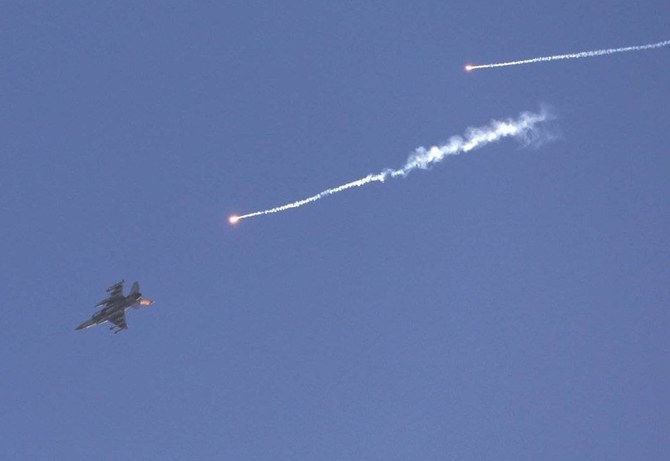
- ARAB NEWS
- 14 Jul 2025

BEIRUT: Israeli warplanes swooped low over the Lebanese capital Beirut on Tuesday, setting off a series of sonic booms that rattled windows across the city minutes before the head of Lebanon’s Hezbollah was set to give an address.
The loud booms sent residents rushing to open their windows to prevent the glass from shattering, or standing on their balconies to get a glimpse of the planes flying over. There was no comment from the Israeli military.
In the capital’s southern suburbs, a Hezbollah stronghold, members and supporters of the Lebanese armed group had gathered to watch a televised speech by its leader to mark the one-week anniversary of Israel’s killing of a senior military commander.
As he began, Sayyed Hassan Nasrallah said the sonic booms were intended to provoke those gathered for the memorial.
The strike that killed commander Fuad Shukr was the second time Israel had struck the southern suburbs in 10 months of hostilities between Hezbollah and the Israeli military that are taking place in parallel with the Gaza war.
Hezbollah earlier on Tuesday said it launched a swarm of attack drones at two military sites near Acre in northern Israel and also attacked an Israeli military vehicle in another location.
The Israeli military said a number of hostile drones were identified crossing from Lebanon and one was intercepted.
Israeli medical officials said seven people were evacuated to hospital, to the south of the coastal city of Nahariya, one in critical condition.
The Israeli military said an initial investigation indicated the injuries were caused by an interceptor that “missed the target and hit the ground, injuring several civilians.” It said the incident was still under review.
Reuters journalists saw one impact site near a bus stop on a main road outside Nahariya.
The Israeli military said in a statement sirens sounded around Acre, but that turned out to be a false alarm. It said its air force struck two Hezbollah facilities in south Lebanon.
Fears are rising that the Middle East could tip into full-blown war following vows by Hezbollah to avenge Shukr’s killing, and by Iran to respond to the assassination in Tehran last week of the head of Palestinian militant group Hamas.
A Hezbollah source told Reuters that “the response to the assassination of commander Fuad Shukr has not yet come.”
Earlier on Tuesday, four Hezbollah fighters were killed in a strike on a home in the Lebanese town of Mayfadoun, nearly 30 km (19 miles) north of the border, medics and a security source said.
Reuters